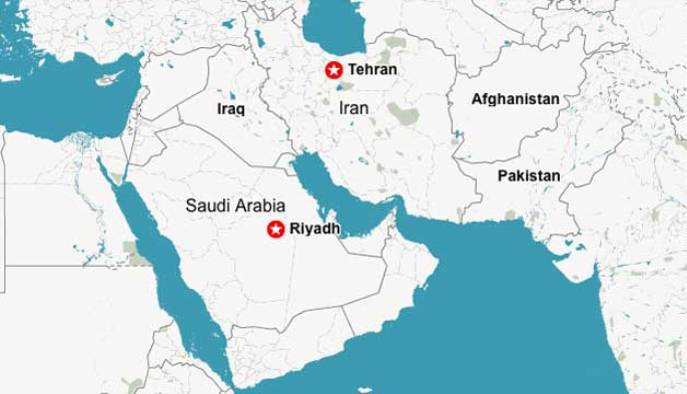How Can Iran Clear Itself of Sectarian Charges?

By: Abbas Parvardeh
Inside Iran, the dominant attitude towards the Shia-Sunni dichotomy is one of 'taghrib', convergence, and mitigating differences in the interest of Muslim solidarity. Outside Iran, however, outwardly 'impartial' political observers on the one hand, and forces who thrive through crisis, employ a strongly instrumentalist approach towards the differences between the two main Islamic sects.
Saudis' behavior is so barefaced that its most strategic ally, the United States, has felt the urge to react in his recent interview with The Atlantic: "The competition between the Saudis and the Iranians –which has helped to feed proxy wars and chaos in Syria and Iraq and Yemen- requires us to say to our friends as well as to the Iranians that they need to find and effective way to share the neighborhood and institute some sort of cold peace."
Although Obama views the Tehran-Riyadh dispute through a diplomatic prism, Americans are the closest observers of religious differences in the Middle East. The reputed US-based PEW has recently released the results of its survey on the view towards Iran and Saudi Arabia in a number of Middle East nations following the execution of the Saudi dissident Shia cleric Sheikh Nimr in January 2016 and the consequent raid on the Saudi embassy in Tehran. Although the research imposes the inherently flawed Shia-Sunni dispute frame on Tehran-Riyadh struggle, it can't be ignored, considering how global actors have focused and capitalized on the Shia-Sunni gap. (Findings of the survey can be found here.)
Validity of such surveys aside, the rising interest of Western institutions in such research is worth consideration. The findings should also come as a concern for the Muslim World amid strenuous efforts by some Muslim, Arab states of the region that have cast away not only Islamic teachings, but also political rationality, and stoke terrorism to fulfill their delusional ambitions.
The Iranian year of 1395 can be the year our country starts a serious process of ridding itself from charges of sectarian policy. After all, Iran started paying a price for its post-Revolution diplomacy after launching a ceaseless campaign in defense of the Palestinian cause and liberation of Jerusalem. But after four decades of threats, sanctions and military action against Iran, and Israel's backstage efforts to raise enmity against our country, some regional media have turned Iran into the party to be blamed. A number of Arab states who should be natural advocates of the Palestinian cause have turned into Israel's official or non-official ally now.
Against this background, formulating a comprehensive diplomatic strategy to handle sectarian differences in the Middle East seems inevitable. The regional actors who mastermind tensions between Shias and Sunnis not only have no intention to stop their efforts, but also regard such efforts as an effective complementary tool to aid their regional policies. They thrive through sectarian tensions, despite the general pro-solidarity, anti-extremist mood of the Muslim World.
Overcoming the crisis in sectarian relations goes beyond holding sporadic conferences and meetings between Muslim scholars and clerics. The complex situation of the present time calls for multilateral, multilayered solutions. Extremism and sectarianism have influenced a considerable segment of the Middle Eastern society, thus there is a significant burden primarily on the shoulder of the media. Public diplomacy must be also employed to shift the dominant framing among the public opinion, which in turn can put pressure on politicians to change their course.
Academic efforts to find the roots of the crises, and intersectarian meetings to find ways in order to reconcile differences are also important. This is how disputes return from the battlefields into the academic circles. Drawing on the valuable experience gained through nuclear talks between Iran and the six world powers can also be helpful.
The road to a number of major regional crises, including the Syrian war, passes through diplomatic control of religious differences. Clearing Iran from sectarian conduct in the Middle East is a prerequisite to its success in solving regional crises. Self-proclaimed rivals of Iran in the recent decades have used sectarianism as the main platform to push forwards their Iranophobia project in order to achieve their goals. Countries such as Saudi Arabia have been the birthplace of extremist ideas; however, the enmity between Iran and the United States in the past four decades and the tacit support of Western states for Riyadh has given way to sectarian, extremist groups to promote their dangerous ideas. Iran is now facing a complex network of sectarian layers in the region whose unwinding needs a patient and prudent approach.
The shift in the US' approach towards the Middle East is an opportunity that should not be missed. Obama concludes his interview with The Atlantic as such: "An approach that said to our friends 'You are right, Iran is the source of all problems, and we will support you in dealing with Iran' would essentially mean that as these sectarian conflicts continue to rage and our Gulf partners, our traditional friends, do not have the ability to put out the flames on their own or decisively win on their own, and would mean that we have to start coming in and using our military power to settle scores. And that would be in the interest neither of the United States nor of the Middle East."

